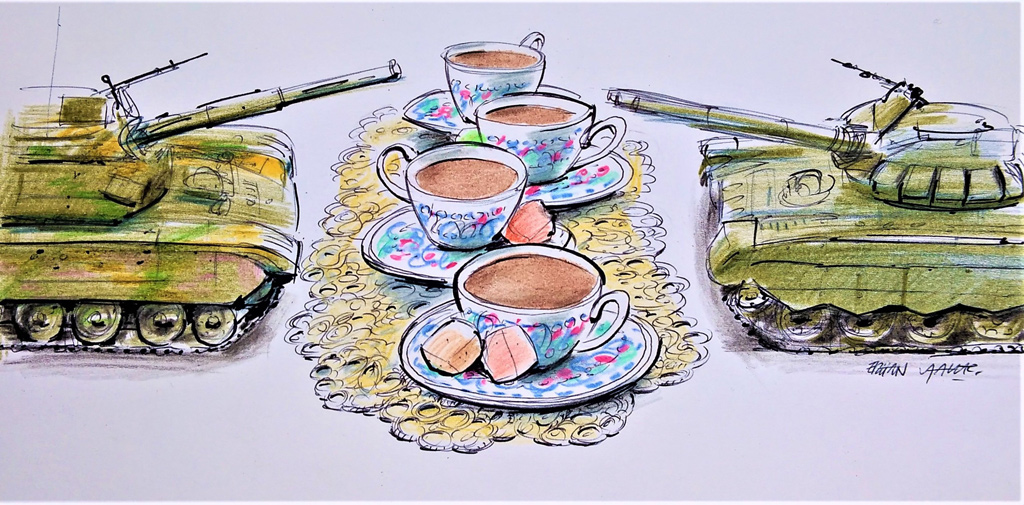Washington and Moscow continue to engage in diplomatic talks over their positions on Ukraine and adjacent region. The American and Russian foreign ministers
met in Geneva on Jan. 21 to voice their concerns and inform each other about their respective positions. Insisting that Russia did not pose a threat to the Ukrainian people, Russian Foreign Minister Sergey Lavrov rejected the claim that his country was going to attack its neighbor. In response to the Russian diplomat’s request for an answer from the United States, U.S. Secretary of State Antony Blinken threatened a "swift, severe and united response" to any steps taken by the Kremlin. The two sides will give their answers this week and, if necessary, the talks will continue between U.S. President Joe Biden and his Russian counterpart President Vladimir Putin.
Meanwhile, Turkey remains among those nations relying on diplomacy to de-escalate tensions in Ukraine. Speaking with reporters after last week’s Friday prayers, while the Americans and the Russians were meeting in Switzerland, President Recep Tayyip Erdoğan touched on the danger that a potential war between Russia and Ukraine would create for the region. Recalling that Turkey had cordial relations with both nations, he reiterated that his country could
"serve as a mediator to ensure that peace prevails" over the neighborhood: "I have
an upcoming trip to Ukraine. I could speak by phone with Mr. Putin or visit him in Moscow as well. We want peace to prevail over the region. We are prepared to live up to any responsibilities we may have here."
For no more violence
Erdoğan, who previously offered to mediate talks in a private meeting with Putin, has been more vocal about that possibility. It goes without saying that Turkey, which cooperates with both countries in many areas, is unhappy with the prospect of war between them. Indeed, the Turks do not want violence to hurt their national interests in defense, energy and tourism. Yet, the fact remains that Turkey, as one of NATO’s most prominent members, could not stay out of the current crisis even if it wanted.
Nor is it surprising that Erdoğan took the initiative amid a crisis that makes the whole world wonder whether a new Cold War is around the corner. Ukraine’s President Volodymyr Zelenskyy, too, welcomes the Turkish president’s offer. The question is when and under what circumstances Putin would get on board. Before answering that question, let me underline that the current escalation between Russia and Ukraine is not limited to
the Donbass region. As a matter of fact, the crisis goes beyond the Kremlin’s "national security" concerns over Ukraine’s potential admission into NATO.
Putin's broader goals
Those obviously important factors represent just one layer of the crisis. The second layer, in turn, relates to Putin’s broader goals. The Russian president seeks to impose a "grand bargain" on his counterparts to determine the future of his country’s relations with the West. In truth, that particular score, which he now wants to settle, is a remnant of the Soviet Union’s disintegration. Still, Biden could not possibly provide a written guarantee to his Russian counterpart regarding NATO’s expansion. To reverse military deployments to Eastern Europe, too, would be seen as too significant a concession. That balance of power between the great powers in Ukraine is exactly why Putin primarily wants to engage in a strategic negotiation with his American counterpart.
Three expectations
The Ukraine crisis, which hardly anyone expects to end anytime soon, could lead to three outcomes. First, Putin could choose to de-escalate tensions after scoring some points in the grand bargain, thus paving the way for direct talks with his Ukrainian counterpart. Secondly, the Russian president might view talks with Ukraine as beneficial, provided that Biden does not give him what he wants and the Western alliance’s political and economic sanctions prove too costly. Finally, Putin could opt for war in Ukraine for failing to get what he wants.
That kind of conflict could be limited in scope or lead to fresh polarization that might be too much for the world to handle right now. Regardless of the outcome, however, Erdoğan’s emphasis on leader-to-leader diplomacy between Putin and Zelenskyy remains rather valuable. Turkey, which
did not recognize the annexation of Crimea, supports Ukraine’s territorial integrity. At the same time, it wants Russia and Ukraine – countries, with which it has cordial relations – to resolve the Donbass crisis through negotiations. Again, Russia could find it more suitable to work with Turkey in the Black Sea, as it already does in the Caucasus.
To sum up, Turkey, which advocates peace, stability and cooperation in its neighborhood, has an active role to play at every stage of the Ukraine crisis, which will seemingly continue for a long time.
[Daily Sabah, January 27, 2022]







